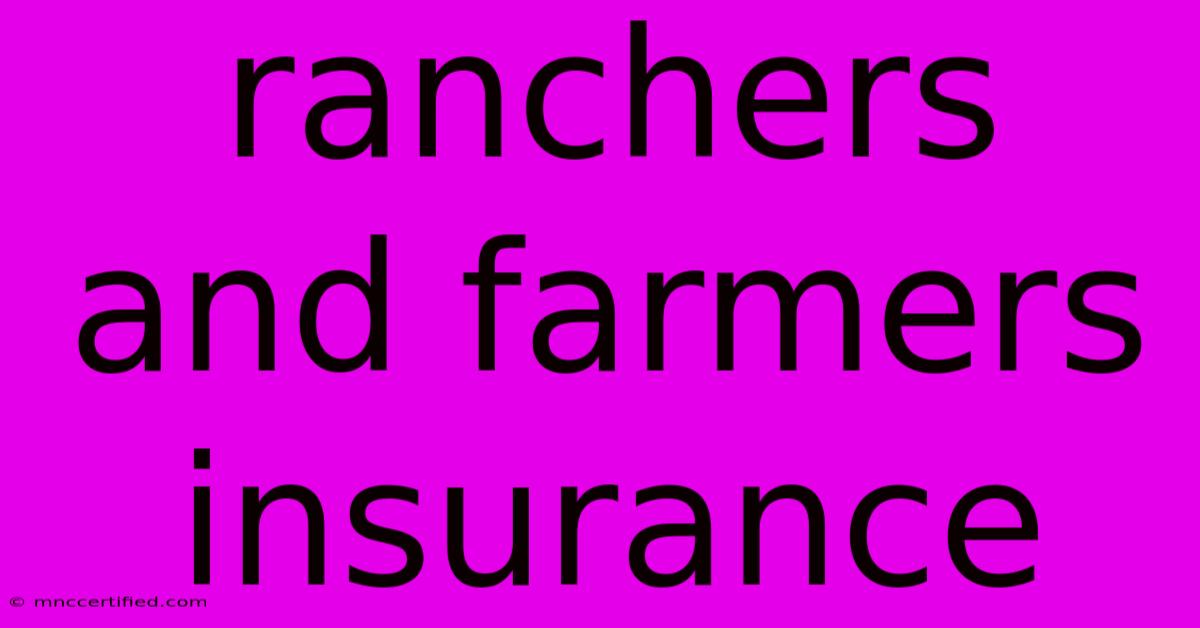Ranchers And Farmers Insurance

Table of Contents
Ranchers and Farmers Insurance: Protecting Your Livelihood
Ranching and farming are inherently risky businesses. From unpredictable weather patterns and fluctuating commodity prices to livestock illnesses and equipment malfunctions, there's a constant threat to your livelihood and investment. That's where the right insurance coverage becomes crucial. This comprehensive guide will explore the essential insurance needs for ranchers and farmers, helping you protect your assets and secure your future.
Understanding the Unique Risks Faced by Ranchers and Farmers
The insurance needs of a rancher differ significantly from those of a traditional business owner or even a suburban homeowner. The unique challenges faced by agricultural producers require specialized coverage. These include:
- Livestock Loss: Death or injury to livestock due to disease, accident, or theft represents a considerable financial blow. Appropriate livestock insurance is paramount.
- Crop Failure: Adverse weather conditions, pests, or diseases can decimate a harvest, leading to substantial financial losses. Crop insurance protects against these risks.
- Equipment Breakdown: Modern farming and ranching rely heavily on machinery. A breakdown can halt operations, causing significant delays and financial setbacks. Equipment insurance is essential for mitigating these issues.
- Liability: Accidents involving visitors, employees, or even stray livestock can result in costly lawsuits. Liability insurance is crucial for protecting your assets from potential claims.
- Property Damage: Farm buildings, barns, and other structures are vulnerable to various hazards, including fire, windstorms, and hail. Property insurance safeguards these valuable assets.
Essential Insurance Types for Ranchers and Farmers
Several insurance types are vital for comprehensive protection:
1. Farm Liability Insurance: Protecting Against Lawsuits
Farm liability insurance is non-negotiable. It protects you from financial losses arising from accidents or injuries on your property, regardless of fault. This coverage extends to bodily injury, property damage caused by your operations, and even advertising injury. Keyword: Farm Liability Insurance
2. Crop Insurance: Safeguarding Your Harvest
Crop insurance mitigates the risk of crop failure due to various factors such as drought, flood, hail, or disease. The government often subsidizes crop insurance, making it a cost-effective way to protect your investment. Different types of crop insurance policies are available, tailored to specific crops and regions. Keyword: Crop Insurance
3. Livestock Insurance: Protecting Your Herd
Livestock insurance protects your animals from death or injury due to disease, accident, or theft. Policies often cover mortality, veterinary expenses, and even loss of market value. The specific coverage offered varies depending on the type of livestock and the policy chosen. Keyword: Livestock Insurance
4. Equipment Insurance: Ensuring Operational Continuity
Equipment insurance covers damage or loss of farm equipment, machinery, and vehicles. This insurance protects against unforeseen breakdowns, accidents, and even theft. Consider coverage for repairs, replacement, and potential loss of income due to equipment downtime. Keyword: Equipment Insurance
5. Property Insurance: Protecting Your Structures and Assets
Property insurance protects your farm buildings, barns, storage facilities, and other structures from damage caused by fire, windstorms, hail, lightning, and other perils. It also may cover personal property stored on your farm. This is critical for safeguarding your investment in infrastructure. Keyword: Farm Property Insurance
Choosing the Right Ranchers and Farmers Insurance Provider
Selecting the right insurance provider is crucial. Consider the following factors:
- Coverage options: Ensure the provider offers comprehensive coverage tailored to your specific needs and the unique risks associated with your operation.
- Financial stability: Choose a financially sound and reputable insurer to ensure they can meet their obligations in the event of a claim.
- Customer service: Look for a provider with excellent customer service and a responsive claims process.
- Price: While price is a factor, don't compromise on coverage for the sake of saving a few dollars.
Beyond Insurance: Risk Management Strategies
Insurance is a critical component of risk management, but it shouldn't be your only strategy. Proactive risk management includes:
- Regular maintenance: Regular maintenance of equipment and facilities can prevent costly breakdowns and repairs.
- Pest and disease control: Implementing preventative measures can minimize crop and livestock losses.
- Diversification: Diversifying your crops and livestock can help mitigate the impact of individual crop failures or livestock illnesses.
By understanding the specific insurance needs of ranchers and farmers and implementing proactive risk management strategies, you can significantly reduce your exposure to financial losses and secure the long-term viability of your operation. Remember to consult with an insurance professional to determine the best coverage for your unique circumstances.

Thank you for visiting our website wich cover about Ranchers And Farmers Insurance. We hope the information provided has been useful to you. Feel free to contact us if you have any questions or need further assistance. See you next time and dont miss to bookmark.
Featured Posts
-
Feyenoord 3 3 Man City Espn Match Breakdown
Nov 27, 2024
-
Vanderpump Rules Renewed Full Cast Returns
Nov 27, 2024
-
Barca Academy Ny Financial Policies
Nov 27, 2024
-
Three Goal Lead Lost Man City Vs Feyenoord
Nov 27, 2024
-
Kimpembe Ramos Feature In Psg Team
Nov 27, 2024